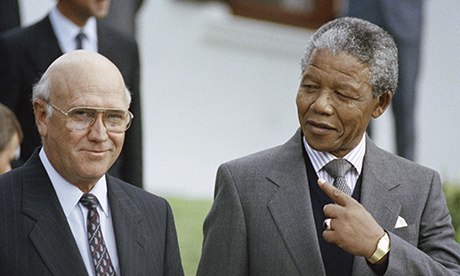guardian | Enough is enough. The publicity for the death and funeral of Nelson
Mandela has become absurd. Mandela was an African political leader with
qualities that were apt at a crucial juncture in his nation's affairs.
That was all and that was enough. Yet his reputation has fallen among
thieves and cynics. Hijacked by politicians and celebrities from Barack
Obama to Naomi Campbell and Sepp Blatter,
he has had to be deified so as to dust others with his glory. In the
process he has become dehumanised. We hear much of the banality of evil.
Sometimes we should note the banality of goodness.
Part of this
is due to the media's crude mechanics. Millions of dollars have been
lavished on preparing for Mandela's death. Staff have been deployed,
hotels booked, huts rented in Transkei villages. Hospitals could have
been built for what must have been spent. All media have gone mad. Last
week I caught a BBC presenter, groaning with tedium, asking a guest to compare Mandela with Jesus.
The corporation has reportedly received more than a thousand complaints
about excessive coverage. Is it now preparing for a resurrection?
More
serious is the obligation that the cult of the media-event should owe
to history. There is no argument that in the 1980s Mandela was "a
necessary icon" not just for South Africans but for the world in
general. In what was wrongly presented as the last great act of imperial
retreat, white men were caricatured as bad and black men good. The
arrival of a gentlemanly black leader, even a former terrorist, well
cast for beatification was a godsend.
Visiting and writing about
South Africa in the last years of white rule in the 1980s, I was acutely
aware that the great struggle was not so much between the white South
Africans and Mandela's ANC, whose leaders were in prison or exile, but
within Afrikanerdom. This was no rebellion against a foreign power. It
was a potential conflict between an impotent majority and a potent
minority, in which the likelihood of the latter giving way to the former
seemed minimal – and unnecessary in the short term.
The first hero of that struggle was the then prime minister, FW de Klerk.
The realisation that his group should cede power to a black government
was a moral conversion as much as realpolitik. The Afrikaners
capitulated not because some mighty power (such as sanctions) had
crushed them or because of the more significant fall of Rhodesia and the
Portuguese empire. Their priests and intellectuals told them apartheid
had lost the argument. They had lost the will. It had been, said De
Klerk, "a terrible wrong".



3 comments:
We would make a giant move in our evolution if we could get away from accepting those damn stories. It's ok that Mandela wasn't Jesus for real. His political instincts should be appreciated for what they are. Those stories were one of Plato's ideas for cattle management. He didn't want critical thinking citizens. A democracy needs citizens that are capable of self governing. By believing the stories we disempower ourselves. And we look at our heroes from the past as superhuman. By getting away from the stories one can look at things with a clear head and strategize. It looks like there are attempts to get away from that myth shit. The tea billies won't let anything tell the truth about their America.
Well, the white supremacists were militarily defeated by Afrikan Cubans, Angolans, and Namibians at Cuito Cuanavale, which was as much of a psychological defeat, as it was a physical defeat.
Of course the imperial psychopaths have a vested interest in reducing the entire 95 years of Rolihlahla’s life and struggle to just one word--forgiveness, specifically forgiveness in the absence of repentance. The same as they have tried to reduce Martin King to a “dreamer.”
“For around the world today, we still see children suffering from hunger and disease. We still see run-down schools. We still see young people without prospects for the future. Around the world today, men and women are still imprisoned for their political beliefs…” -- Obama
Around the world, including the United States, which has political prisoners who’ve been incarcerated longer than the 27 years Rolihlahla spent in prison. So, if forgiveness is such an honorable characteristic, where is the forgiveness of the American power structure?
The Afrikaners had lost the will, not the means to achieve military victory. http://subrealism.blogspot.com/2013/12/yeah-um-no-anc-didnt-need-any-nuclear.html
Mandela and the ANC provided mimetic cover for the South African elites to maintain their capital hegemony while transitioning out of the role of James Bond supervillains and avoiding permanent global elite censure by committing the WMD atrocities required to sustain their totalitarian minority political rule.
In the wake of Fukushima, or we could say more accurately, in the wake of lessons-learned from Chernobyl, global elites have identified the means for committing the levels of mass murder required to draw down human population overshoot while enjoying plausible denial of culpability for the same.
Post a Comment